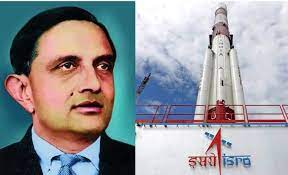Dr. Vikram Sarabhai: The First Chairman of ISRO
The Indian Space Research Organisation (ISRO) has a remarkable legacy of achievements in space exploration and satellite technology. At the heart of ISRO’s inception and early growth was Dr. Vikram Sarabhai, a visionary scientist and the organization’s first chairman. In this article, we delve into the life and contributions of Dr. Sarabhai and how his work continues to inspire aspirants preparing for various government exams.

Why this News is Important:
The Visionary Leader: Dr. Vikram Sarabhai’s visionary leadership and commitment to peaceful space exploration serve as an inspiration for aspirants preparing for civil service positions, showcasing how one individual’s dedication can shape an entire organization’s destiny.
Scientific Advancements: Understanding the historical context of ISRO’s formation and early successes helps students grasp the evolution of India’s space program, a crucial topic for exams in fields such as defense and science and technology.
Historical Context:
Dr. Vikram Sarabhai, born in 1919, was a brilliant scientist with a passion for space exploration. He played a pivotal role in establishing ISRO in 1969, envisioning a space agency that would harness space technology for India’s development. His foresight led to the creation of India’s first satellite, Aryabhata, in 1975. Dr. Sarabhai’s efforts paved the way for India’s space program to take flight, quite literally.
Key Takeaways from “This News”:
| Serial Number | Key Takeaway |
|---|---|
| 1 | Dr. Vikram Sarabhai was the first chairman of ISRO, known for his visionary leadership. |
| 2 | His contributions led to the establishment of ISRO and the launch of India’s first satellite, Aryabhata. |
| 3 | ISRO’s growth during his tenure included the successful launch of the Rohini satellite in 1980. |
| 4 | Dr. Sarabhai’s focus on peaceful space exploration laid the foundation for various applications of space technology. |
| 5 | His legacy continues to inspire aspirants preparing for government exams, emphasizing the importance of visionary leadership in achieving goals. |
Important FAQs for Students from this News
Q1: Who was Dr. Vikram Sarabhai, and why is he important in the context of ISRO?
A1: Dr. Vikram Sarabhai was a renowned Indian scientist and the first chairman of ISRO. He is important because he played a pivotal role in establishing ISRO and India’s space program, shaping its early growth and successes.
Q2: What were some of the significant achievements of ISRO under Dr. Sarabhai’s leadership?
A2: ISRO, under Dr. Sarabhai’s leadership, achieved milestones like launching India’s first satellite, Aryabhata, and the successful launch of the Rohini satellite in 1980. These marked India’s entry into space technology and satellite deployment.
Q3: How did Dr. Sarabhai’s emphasis on peaceful uses of space technology benefit India?
A3: Dr. Sarabhai’s focus on peaceful space exploration led to the development of applications in communication, meteorology, and earth observation. This benefited India by improving telecommunications, weather forecasting, and resource management.
Q4: What is the relevance of Dr. Sarabhai’s legacy for students preparing for government exams?
A4: Dr. Sarabhai’s life and work exemplify visionary leadership and dedication. Studying his contributions can inspire aspirants, emphasizing the importance of leadership and innovation in achieving goals, a relevant topic for many government exams.
Q5: Where can I find more information about Dr. Vikram Sarabhai and ISRO’s history for exam preparation?
A5: You can refer to authoritative sources like ISRO’s official website, books on Indian space history, and reputable current affairs websites for in-depth information.
Some Important Current Affairs Links

















